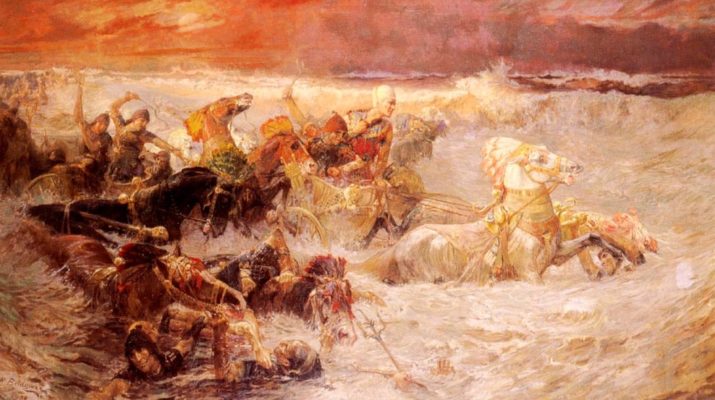Psalm 33
1 RejoiceA in the Lord,B O you righteous.C
PraiseD befitsE the upright.F
A “rejoice” = ranan. This is a cry of joy or a joyful song. Properly, it is emitting a shrill sound, especially one of joy.
B “Lord” = YHVH. From havah (to be, become) or hayah (to come to pass, become, be). This is the name of the God of Israel, the self-existent and eternal one, the tetragrammaton. This pronunciation has been lost to time so “Lord” is generally used in its place.
C “righteous” = tsaddiq. From the same as tsedeq (rightness, righteousness, just cause, vindication; that which is right in a natural, moral, or legal sense; abstractly equity; figuratively prosperity). This is just, innocent, righteous, righteous one, or lawful.
D “praise” = tehillah. From halal (to praise, be boastful). This is praise or a song of praise. It is to offer God a hymn, to boast in God. This shares a root with “hallelujah.”
E “befits” = naveh. 10x in OT. From naah (to be at home and so pleasant, beautiful) or naveh (home, place where shepherd or sheep live; at hme implies a lovely place or a place of satisfaction); from navah (home, beautify, praise). This is beautiful, becoming, fitting, worthy of praise.
F “upright” = yashar. From yashar (to be straight, right, even, smooth, or agreeable; figuratively, to make something pleasant or prosperous). This is straight, right, level. Also, it is pleasing, whether pleasing God or pleasing other people. So, it is upright or righteous.
2 PraiseG the Lord with the lyre;H
make melodyI to him with the harpJ of ten strings.
G “praise” = yadah. From yad (hand). This is to throw one’s hands into the air in a gesture of praise. So, it is to praise, give thanks, or make a confession.
H “lyre” = kinnor. Root may be to twang. This is a lyre or harp.
I “make melody” = zamar. Perhaps from zamar (to trim or prune). This is making music. It is used specially of music to worship God. So, music with singing, singing praise, or singing psalms.
J “harp” = nebel. From nabel (to fall away, faint, wither, languish, sink; figuratively, being senseless, foolish, or wicked; to despise, disgrace, or fall to nothing, to be seen with contempt). This is a vessel, perhaps made of skins for holding liquids. It could be a skin, vase, or lyre as having a similar shape.
3 Sing to him a newK song;
playL skillfullyM on the strings, with loud shouts.N
K “new” = chadash. From chadash (to renew or restore, to repair or rebuild). This is something fresh or new.
L “play” = nagan. 15x in OT. This is to strike a stringed instrument, to pluck or play it. It can also refer to a musician or a melody.
M “skillfully” = yatab. This is to be good or pleasing, joyful. It can also mean doing good in an ethical sense or be beautiful, happy, successful, or right.
N “loud shouts” = teruah. From rua (to break or destroy something so figuratively, an ear splitting sound such as a call of alarm or a joyful sound). This is an alarm, trumpet sound, battle cry, rejoicing, joyful shout, or jubilee.
4 For the wordO of the Lord is upright,
and all his workP is done in faithfulness.Q
O “word” = dabar. From dabar (to speak, declare, discuss). This is speech, a word, a matter, an affair, charge, command, message, promise, purpose, report, request. It is a word, which implies things that are spoken of in a wide sense.
P “work” = maaseh. From asah (to do, make, accomplish, become). This is a word – any action whether positive or negative. It can also be a transaction, construction, activity, property, or something that is produced.
Q “faithfulness” = emunah. From aman (to believe, endure, fulfill, confirm, support, be faithful, put one’s trust in, be steadfast. Figuratively, this is to be firm, steadfast, or faithful, trusting, believing, being permanent, morally solid). This word is literally firmness, but figuratively fidelity, faithfulness, honesty, responsibility, trust, truth, steadfastness. This word shares a root with the word “Amen.”
5 He loves righteousnessR and justice;S
the earthT is fullU of the steadfast loveV of the Lord.
R “righteousness” = tsedaqah. Related to “righteous” in v1. From the same as tsedeq (see note C above). This is righteousness, justice, righteous acts, and moral virtue.
S “justice” = mishpat. From shaphat (to judge, defend, pronounce judgment, condemn, govern). This is a verdict or formal sentence whether from humans or from God. It includes the act of judging as well as the place that judging takes place, the suit itself, and the penalty. Abstractly, this is justice, which includes the rights of the participants.
T “earth” = erets. Root may mean to be firm. This is earth, ground, field land, or country.
U “is full” = male. This is fill, satisfy, replenish, accomplish, fulfill, confirm, or consecrate. It is fill in a literal or figurative sense.
V “steadfast love” = chesed. From chasad (being good, kind, merciful; may mean bowing one’s neck as is done in the presence of an equal for courtesy’s sake; so, if one in a superior position is treating you like an equal, that is what is captured here). This is favor, goodness, kindness, loving kindness, pity, reproach, or a good deed. When done by God to humanity, this is mercy/loving kindness. When done by humanity to God, it is piety.
6 By the word of the Lord the heavensW were made,X
and all their hostY by the breathZ of his mouth.
W “heavens” = shamayim. Root may mean being lofty. This is sky, the air, or heaven. It is in a dual noun form so this might refer to the part of the sky where the clouds move on the one hand and the part beyond that where the sun, moon, and stars are on the other hand.
X “made” = asah. Related to “work” in v4. See note P above.
Y “host” = tsaba. From tsaba (to wage war, serve, assemble, fight, perform, muster, wait on). This is a large group of persons (used figuratively for a group of things). It implies a campaign literally as with army, war, warfare, battle, company, soldiers. Can also be used figuratively for hardship or for worship.
Z “breath” = ruach. This is breath, wind, air, cool, spirit. This is wind, which resembles the breath and so this can be used figuratively for life itself or being frail/mortal/impermanent. It can refer to the air of the sky or the spirit.
7 He gatheredAA the waters of the seaBB as in a bottle;CC
he put the deepsDD in storehouses.EE
AA “gathered” = kanas. 11x in OT. This is to gather, assemble, enfold.
BB “sea” = yam. Root may mean to roar. This is the sea, often referring to the Mediterranean. It comes from the root in the sense of the roar of crashing surf. This word is sometimes used for rivers or other sources of water. It can mean to the west or to the south.
CC “bottle” = ned. 6x in OT. From nud (to nod, waver, wander, flee, show grief, disappear; nodding the head as a sign of sympathy or consolation; tossing one’s head to show contempt or to taunt). This is a heap or mound – it can imply a wave.
DD “deeps” = tehom. Perhaps from hum (to roar, murmur, cause an uproar, agitate; to defeat in battle, destroy). This is the deep or the abyss. Either understood as a formless empty place of nothingness or as a place of confusion filled with water – the deep the feeds the waters of the earth.
EE “storehouses” = otsar. From atsar (to store up, hoard). This is treasure or the place where one keeps treasure – a depository, storehouse, armory, cellar.
8 Let all the earth fearFF the Lord;
let all the inhabitantsGG of the worldHH stand in aweII of him.
9 For he spoke, and it came to be;
he commanded,JJ and it stood firm.KK
FF “fear” = yare. This is to fear, be afraid, dreadful. It can also refer to fearful reverence – to fear in a moral sense is to say to revere, respect.
GG “inhabitants” = yashab. This is to sit and so to remain and so to dwell. It is sitting for any reason – as a judge, in order to ambush, or just sitting quietly. Causatively, this can mean settling or marrying. This can also mean continue, endure, or establish.
HH “world” = tebel. From yabal (to lead, bring, carry, conduct; properly, to flow; to bring or lead with fanfare). This is world, confusion, inhabited part of the earth, but also used for the whole world.
II “stand in awe” = gur. Properly, this is the act of turning off the road for any reason. So, it means sojourning, becoming a guest. It can mean being fearful since one is outside of home territory. It can also mean dwelling, living, or inhabiting if one has turned off the root to encamp for a longer duration. This word is where the Hebrew “ger” comes from, which is the word translated “stranger” or “resident alien.”
JJ “commanded” = tsavah. This is to charge, command, order, appoint, or enjoin. This is the root that the Hebrew word for “commandment” comes from (mitsvah).
KK “stood firm” = amad. This is to stand up in a literal or figurative sense. So it can be establish, continue, endure, take a stand, act, be a servant, stand still, remain, stand against an enemy.
10 The Lord brings the counselLL of the nationsMM to nothing;NN
he frustratesOO the plansPP of the peoples.QQ
LL “counsel” = etsah. From yaats (to counsel, advise, determine). This is advice, purpose, plan, prudence, or counselor.
MM “nations” = goy. From the same root as gevah (the back, person, or body); related to gev (among); related to gaah (to rise up). This is nation or people. Often used to refer to Gentiles or foreign nations. It can also be used figuratively for a group of animals. This is where the Yiddish “goy” comes from.
NN “brings…to nothing” = pur. 3x in OT. From parar (to break, defeat, frustrate, caste off, clean, cease). This is to break, crush, or take utterly.
OO “frustrates” = nu. 8x in OT. This is to hinder, discourage, refuse, break, or disallow.
PP “plans” = machashabah. From chashab (literally to weave; figuratively to think or plot something malicious). This is thought, scheme, imagination, purpose, or a plan either good or evil.
QQ “peoples” = am. From amam (to darken, hide, associate; creating shadows by huddling together). This is people or nation. It can be used specifically for a tribe, collectively of troops or armies, or figuratively to refer to a flock of animals.
11 The counsel of the Lord stands forever,RR
the thoughtsSS of his heartTT to all generations.UU
RR “forever” = olam. This is a long scope of time whether in the past (antiquity, ancient time) or in the future (eternal, everlasting).
SS “thoughts” = machashabah. Same as “plans” in v11. See note PP above.
TT “heart” = leb. May be related to labab (to encourage; properly, to be encased as with fat; used in a good sense, this means to transport someone with love; used in a bad sense, it can mean to dull one’s senses). This is the heart, courage, one’s inner self, the mind, or the will. Heart is only used in a figurative sense in the Old and New Testaments.
UU “to all generations” = dor + dor. Literally “to generation and generation.” From dur (to move in a circle, which implies living somewhere or remaining there; it can also be the sense of piling or heaping up). This is a revolution of time, which is to say, an age or generation. It can also be a dwelling or one’s posterity.
12 HappyVV is the nation whose GodWW is the Lord,
the people whom he has chosenXX as his heritage.YY
VV “happy” = esher. From ashar (to go straight, lead, guide; to be level and so to be right, blessed, honest, happy). This is happy or blessedness.
WW “God” = Elohim.
XX “chosen” = bachar. This is to choose, appoint, try, excellent.
YY “heritage” = nachalah. Perhaps related to nachal (to inherit, occupy, distribute, take as heritage). This is properly something that was inherited. It can mean occupancy generally or, more particularly, an heirloom or an estate. This can be an inheritance, gift, possession, or portion.
13 The Lord looksZZ down from heaven;
he seesAAA all humankind.BBB
14 From whereCCC he sits enthronedDDD he watchesEEE
all the inhabitants of the earth—
ZZ “looks” = nabat. This is to behold, look at intently, consider, or scan. It can mean to have respect or regard someone favorably.
AAA “sees” = raah. This is to see in a literal or figurative sense so stare, advise, think, view.
BBB “humankind” = ben + adam. Literally “sons of humankind.” Ben is son, age, child. It is son in a literal or figurative sense. Adam is from adam (to be red, make ruddy); related to adamah (ground, dirt, earth). This is man, humankind, also Adam’s name. It refers to a human individual or humanity.
CCC “where” = makon. 17x in OT. From kun (properly, in a perpendicular position; literally, to establish, fix, fasten, prepare; figuratively, it is certainty, to be firm, faithfulness, render sure or prosperous). This is a foundation, fixture, basis. It can also be a place or abode as somewhere that is established.
DDD “sits enthroned” = yashab. Same as “inhabitants” in v8. See note GG above.
EEE “watches” = shagach. 3x in OT. This is to gaze, peep, or glance.
15 he who fashionsFFF the hearts of them all,GGG
and observesHHH all their deeds.III
FFF “fashions” = yatsar. Perhaps related to yatsar (to be narrow, distressed, or vexed); perhaps related to tsarar (to bind, restrict, narrow, be cramped, an adversary). This is to fashion or form, perhaps by squeezing something into a shape or form. Particularly, it is to create as a potter does. Figuratively, it is to determine.
GGG “all” = yachad. From yachad (to join, be united). This is a unit, both, altogether, unitedness, alike.
HHH “observes” = bin. This is to discern, consider, attend to. It refers to distinguishing things in one’s mind or, more generally, to understand.
III “deeds” = maaseh. Same as “work” in v4. See note P above.
16 A king is not savedJJJ by his greatKKK army;LLL
a warriorMMM is not deliveredNNN by his great strength.OOO
JJJ “saved” = yasha. To deliver, defend, help, preserve, rescue, be safe. Properly, to be open, wide or free, which implies being safe. Used causatively, it means to free.
KKK “great” = rob. From rabab (to be or become much or many, multiply). This is any kind of abundance.
LLL “army” = chayil. From chul(to be firm, strong, prosperous; to endure). This is strength, wealth, ability, activity. It can refer to soldier or a company of soldiers as well as goods. It is a force of people, means, or goods. It can speak of valor, virtue, or strength.
MMM “warrior” = gibbor. From gabar (to be strong or mighty; to prevail or be insolent). This is strong, mighty, or powerful. This can imply a warrior, hero, or tyrant.
NNN “delivered” = natsal. This is to snatch someone or something away in a good sense – as rescue, defend, or deliver – or in a bad sense – as strip or plunder.
OOO “strength” = koach. Root may mean to be firm. This is power, strength, force. It can be literal or figurative, positive or negative. It can also mean capacity or means – what something produces. Additionally, it could refer to some kind of small reptile.
17 The war horsePPP is a vain hopeQQQ for victory,RRR
and by its great mightSSS it cannot save.TTT
PPP “war horse” = sus. Root may mean to skip as in jump for joy. This is a crane or a swift bird. It is also a horse as leaping.
QQQ “vain hope” = sheqer. This is deception, lie, or disappointment. It can also be something that is vain or wrongfully
RRR “victory” = teshuah. Related to “saved” in v16. From yasha (see note JJJ above). This is deliverance, help, salvation, or safety.
SSS “might” = chayil. Same as “army” in v16. See note LLL above.
TTT “save” = malat. This is to be smooth, which implies to escape as slipping away from. It can also be release, rescue, deliver, or preserve. It can be used specifically to meaning giving birth or making sparks.
18 TrulyUUU the eyeVVV of the Lord is on those who fearWWW him,
on those who hopeXXX in his steadfast love,
19 to deliver their soulYYY from death,
and to keep them alive in famine.ZZZ
UUU “truly” = hinneh. From hen (lo! Behold! If, though; an expression of surprise). This is to draw attention, show suddenness or surprise, or to emphasize the importance of the coming statement. See! Lo! Behold!
VVV “eye” = ayin. This is eye in a literal or figurative sense so eye, appearance, favor, or a fountain (the eye of the landscape).
WWW “fear” = yare. Related to “fear” in v8. From yare (see note FF above). This is fearful or morally reverent.
XXX “hope” = yachal. This is to wait, which implies patience, hope, and trust. It can also be pained waiting.
YYY “soul” = nephesh. Related to naphash (to refresh or be refreshed). This is soul, self, person, emotion. It is a breathing creature. Can also refer to appetites and desires.
ZZZ “famine” = raab. From raeb (to be hungry). This is hunger, death, or hunger from famine.
20 Our soul waitsAAAA for the Lord;
he is our helpBBBB and shield.CCCC
21 Our heart is gladDDDD in him,
because we trustEEEE in his holyFFFF name.GGGG
22 Let your steadfast love, O Lord, be upon us,
even as we hope in you.
AAAA “waits” = chakah. 14x in OT. Perhaps related to chaqah (to carve, cut in). This is to long for, await, or lurk in ambush.
BBBB “help” = ezer. From azar (to help, protect, support, ally; properly, to surround so as to provide aid). This is help, aid, or helper. This word is used in Genesis 2:18 when God decides to make for Adam, “a helper as his partner.” If the same word can be used of God’s help (as in Psalm 121:1), then we should not downplay the significance of this formulation of “help.”
CCCC “shield” = magen. From ganan (to surround, cover, defend, protect). This is a shield, defense, or figuratively a protector. It can alszo be used for a crocodile’s hide.
DDDD “is glad” = samach. This is to rejoice or be glad. Properly, it is to brighten up in a literal or figurative sense.
EEEE “trust” = batach. This is to hide for refuge, be secure or sure. Figuratively, it refers to trust, being confident, or hoping.
FFFF “holy” = qodesh. This is set apart and so sacred. God is different from us and so God is holy/set apart. Things we dedicate to God’s service are set apart for God and so they, too, are holy, etc.
GGGG “name” = shem. May be from sum (to put, place, set). This is name, fame, renown. A name was thought to indicate something essential about a person – something about their individuality. So, this word can also mean honor, authority, or character.
Image credit: “Pharaoh’s Army Engulfed by the Red Sea” by Frederick Bridgman, 1900.




